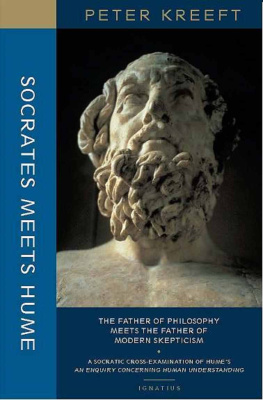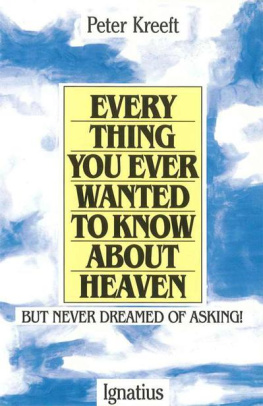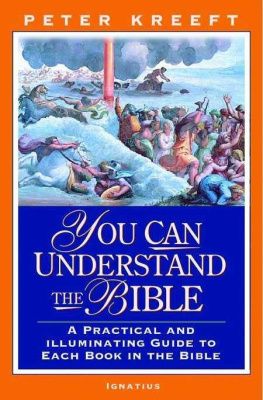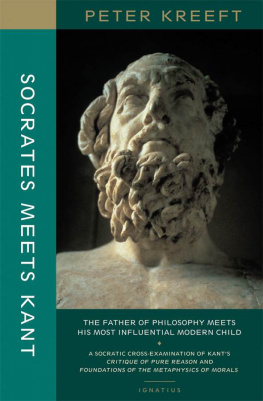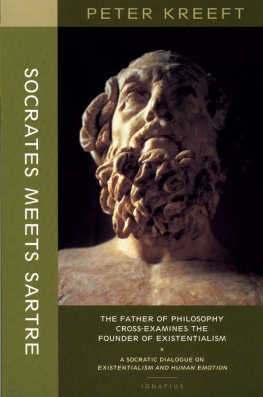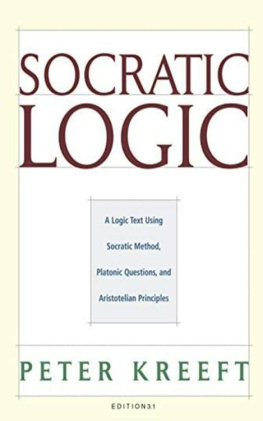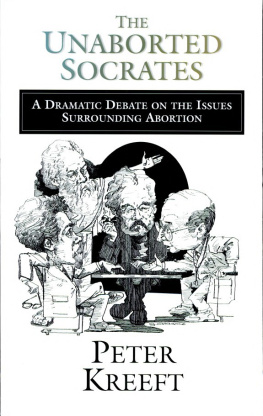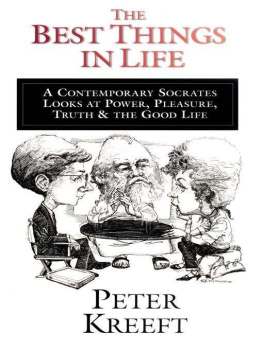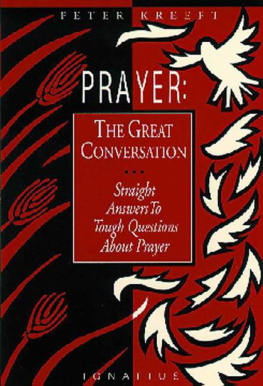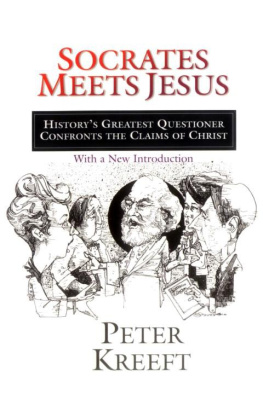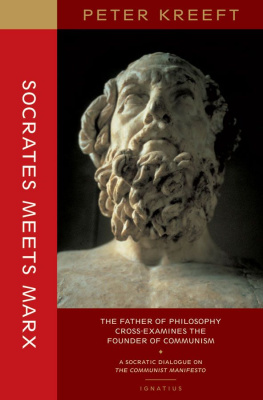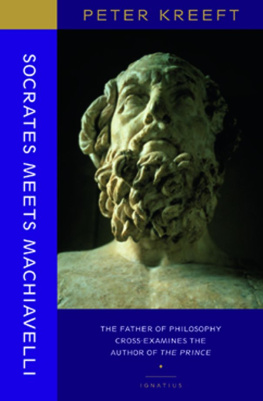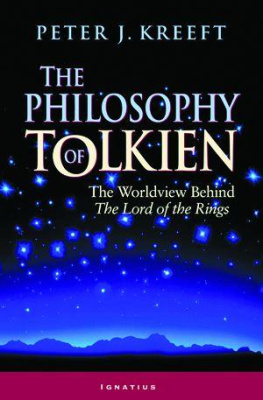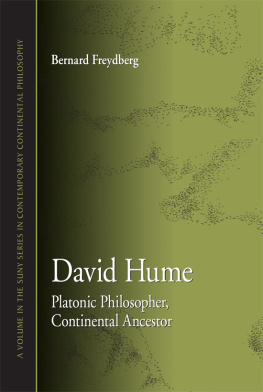Socrates Meets Hume
Socrates Meets Hume
______
The Father of Philosophy Meets
The Father of Modern Skepticism
A Socratic Examination of
An Enquiry Concerning
Human Understanding
by Peter Kreeft
IGNATIUS PRESS SAN FRANCISCO
Cover art: Stone Head of an Ancient Greek (469-399 B.C.)
(classic sculpture)
The Louvre, Paris, France / Bridgeman Art Library
Cover design by Roxanne Mei Lum
2010 Ignatius Press, San Francisco
All rights reserved
ISBN 978-1-58617-260-2
Library of Congress Control Number 2008933491
Contents
Preface
This book is one in a series of Socratic explorations of some of the Great Books. Books in this series are short, clear, and nontechnical, thus fully understandable by beginners. They also introduce (or review) the basic questions in the fundamental divisions of philosophy: metaphysics, epistemology, anthropology, ethics, logic, and method. They are designed both for classroom use and for educational do-it-yourselfers. The Socrates Meets... books can be read and understood completely on their own, but each is best appreciated after reading the little classic it engages in dialogue.
The settingSocrates and the author of the Great Book meeting in the afterlifeneed not deter readers who do not believe there is an afterlife. For although the two characters and their philosophies are historically real, their conversation, of course, is not and requires a willing suspension of disbelief. There is no reason the skeptic cannot extend this literary belief also to the setting.
Introduction
Hume is the most formidable, serious, difficult-to-refute skeptic in the history of human thought.
I will never forget my first exposure to him, in a seminar in Modern Philosophy at Calvin College taught by William Harry Jellema, who was the best teacher I ever had but who, like Socrates, never wrote a book. All ten of us in the seminar were philosophy majors and friends. We had to read Hume over vacation week. We took this great skeptic very seriously, because we were more concerned with finding the truth than with finding an A, and Hume deeply disturbed us because we could not refute his arguments, yet could not accept his skeptical conclusions. For if we did, what would become of philosophy? What would become of science and common sense and religion and morality and education and human knowledge in general? The whole process of liberation from the cave of ignorance would be merely another cave.
We shared our anguish with the professor when classes resumed, but instead of telling us the answers, he simply sent us back to Hume again, with the reminder to remember our logic. If we did not accept Humes conclusion, we had to find either an ambiguously used term, or a false premise, expressed or implied, or a logical fallacy. It was not sufficient simply to say we disagreed with his conclusion; we had to refute his argument.
That is the process you are invited to participate in, with the aid of Socrates.
No one wants to be a skeptic; no one is happy as a skeptic, except the unpleasant type who just want to shock and upset people. Happy skeptics are dishonest; unhappy skeptics are honest. (The same is true of atheists. Only idiots, masochists, or immoralists want to be atheists. Contrast Sartre, the happy hypocritical atheist, with Camus, the unhappy, honest atheist.) Hume is an unhappy skeptic, an honest skeptic, and he demands and deserves to be taken very seriously and answered very carefully.
He also deserves this because of his continuing, enormous influence on English-speaking philosophy today. Humes immediate thought-child was the extreme, dogmatic, reductionistic form of analytic philosophy that called itself logical positivism, as summarized in A. J. Ayers Language, Truth and Logic . This is no longer in vogue, but softer, modified versions of it are, and they all go back to Hume, especially his reduction of all objects of human reason to matters of fact and relations of ideas. These are approximately what Kant later called synthetic a posteriori propositions and analytic a priori propositions. But please dont close this book and run when you see these verbal monsters. Hume uses a minimum of such technical terms and gives clear, common-sense definitions of each of them. Hume may be disturbing, and he may be disturbed, and he may even be dull sometimes (I tried to omit all the dull passages), but he is always clear.
Hume is also very important because of his influence on Kant and because of the influence of both Hume and Kant on all subsequent philosophy. Kant says it was Hume who woke him from his dogmatic slumber. And by his Copernican revolution in philosophy, which was his answer to Hume, Kant divided the history of Western philosophy in two (the pre-Kantian and the post-Kantian) almost as Christ divided history into B.C. and A.D. (The next book in this series will be on Kant.)
Humes philosophy, like that of Locke and Berkeley before him, is an Empiricist critique of the Rationalism of Descartes, the father of modern philosophy. Humes skeptical conclusions were the logical consequences of Lockes Empiricist starting point. They were conclusions that Locke did not draw because they were too radical. By his relationship to both his successors and his predecessors, Hume holds a crucial position in the history of Western philosophy, that great conversation that began with Socrates and is still going on.
The typical three-stage bare-bones summary of classical modern philosophy is: Descartes Rationalism versus Humes Empiricism versus Kants Idealism. All three are theories in epistemology . Most of the philosophy in that astonishingly rich two-hundred-year period between the publication of Descartes Discourse on Method in 1637 and the death of Hegel in 1831, the period of classical modern philosophy, was concerned with epistemology. Epistemology means theory of knowledge. (What is knowledge? How do we know? How does it work? How should it work?) It is probably the trickiest and most purely theoretical division of philosophy. Yet it is foundational, for any position you take in epistemology will always have consequences for, and make a great deal of difference to, all the rest of your philosophy: your metaphysics, cosmology, philosophical theology, anthropology, ethics, and political philosophy.
Philosophers frequently write two versions of their thoughts, one long and the other short. Inevitably, the short book becomes the classic, the book that is well known and loved, while the longer one becomes the subject of advanced and abstruse doctoral dissertations. Descartes wrote the simple Discourse on Method as well as the more difficult Meditations . Kant wrote the relatively simple and short Prolegomena to any Future Metaphysic as well as the formidable and long Critique of Pure Reason . He also wrote the short and simple Fundamental Principles of the Metaphysics of Morals as well as the long and complex Critique of Practical Reason . Similarly, Hume wrote the short Enquiry Concerning Human Understanding as well as the longer Treatise on Human Nature .
Like his readers, he preferred his shorter work. In fact he explicitly called his earlier, longer book that juvenile work in the preface to the posthumous 1777 edition of the later one (the Enquiry ), adding: Henceforth the Author desires that the following pieces may alone be regarded as containing his philosophical sentiments and principles.
This book is a short Socratic critique of Humes short classic, the Enquiry Concerning Human Understanding , in the form of a Socratic dialogue between the two philosophers who meet after death. In quoting Humes words, I have altered some of the punctuation, since eighteenth-century English style multiplied commas in a way that appears bewildering and confusing to twenty-first-century readers.
Next page
